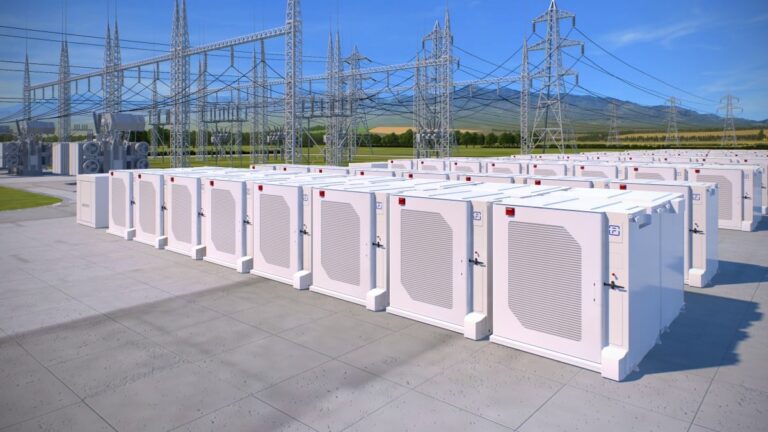Ireland’s state-owned electricity company ESB has opened a 150MW/300MWh battery energy storage system (BESS) at its Aghada site in Co Cork.
The project is the latest step in ESB’s commitment to invest EUR 300 million in battery storage technology. The first BESS site was launched in 2022, a 19 MW/38 MWh project, also located in Aghada.
ESB CEO Paddy Hayes called the launch of the company’s “largest battery storage project to date” a “major milestone”. It replaces the 75MW/150MWh BESS at Poolbeg in Dublin as ESB’s largest project.
ESB, which is approximately 95% owned by the Irish state with the remaining stake held by its employees, partnered with Fluence – a global provider of energy storage products, services and software – and Irish company Powercomm Group to project to be carried out.
ESB and Fluence collaborate on much of the former’s portfolio and Powercomm Group has also previously provided engineering, procurement and construction (EPC) services for ESB.
At the launch of the site, EU Commissioner for Democracy, Justice and Rule of Law Michael McGrath said: “Through the implementation of projects like this, which will facilitate more renewable energy sources into the electricity system, it is clear that the ESB will strengthen its relationship with Co Cork be continued in the future.
“This technology, provided by ESB and their partners, can play an important role in achieving climate goals, both in Ireland and at European level, in the pursuit of net zero carbon emissions.”
In addition to the two BESS developments, the ESB site in Aghada houses a 708 MW gas plant. The company aims to reach net zero by 2040. The Poolbeg site, home to ESB’s 75MW BESS, will house a combination of clean energy technologies including offshore wind, hydrogen and battery storage over the next decade.
Both Ireland and Northern Ireland have set a target of getting 80% of the countries’ electricity from renewable sources. Currently, the Irish electricity grid can capture up to 75% of electricity from renewable sources at any one time, known as the system non-synchronous penetration limit (SNSP).
BESS can play an important role in supporting the successful integration of variable generation sources such as wind energy; Energy consultancy Cornwall Insight predicts that battery storage capacity in Ireland’s short- to medium-term internal electricity market (SEM) will increase fivefold by 2030.
ESB Networks announced in April this year that the Irish electricity grid had 1GW of energy storage available from energy storage assets, comprising 731.5MW of battery storage projects and 292MW from the Turlough Hill pumped storage facility.
Solar market research recently found that 36MWh of national storage capacity comes from co-located storage with solar sites. The co-located storage with the solar market represents a pipeline of 1.5 GW/2.4 GWh, which is steadily increasing.


